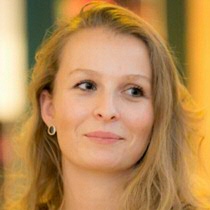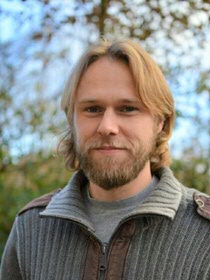Veni grants for seven Groningen STEM researchers
The Dutch Research Council (NWO) has awarded a Veni grant of up to € 280,000 each to seven researchers of the Faculty of Science and Engineering (University of Groningen, the Netherlands): Sebastian Beil, Johanna Antonia ten Brink, Samer Kurdi, Guinevere Lageveen-Kammeijer, Francesca Rizzo, Hendrik van Waarde, and Oscar Franken. The Veni grants are designed for outstanding researchers who have recently gained a PhD.
The NWO selects the researchers on the basis of their quality, the innovative nature of their research, and the expected societal impact of their research proposal. The Veni grants, together with the Vidi and Vici grants, are part of the NWO Talent Programme. In total, the NWO has provided Veni funding to fifteen promising early-career researchers of the University of Groningen, and nationwide to 188 researchers.

Lighting the Way of Drug Discovery: Photochemical Synthesis of Non-Natural Amino Acids
Dr. Sebastian Beil, Stratingh Institute for Chemistry
The photochemical synthesis of non-natural amino acids is a promising approach for drug discovery. Thismethod utilizes visible light to create new amino acids that can be incorporated into proteins or smallmolecules to create new drug candidates with improved properties such as increased stability or specificity.Mild photochemical synthesis of non-natural amino acids also allows for the precise control of their chemicalstructure, which can lead to more selective and effective drug candidates. In this project new non-naturalamino acids will be made with blue light photocatalysis to ensure a supply of these powerful building blocksfor future medicines.
The bigger the better, the smaller the faster: Why do males and females grow apart?
Dr. J. A. ten Brink, Groningen Institute for Evolutionary Life Sciences
In many animal species males and females look differently. This has consequences for the management of populations since males and females will respond differently to environmental change. Differences between the sexes are often not fixed, but change during the development of an individual due to environmental conditions, for example food availability. In this project, the researcher will study how environmental conditions affect the evolution of sex differences and what the consequences of these differences are for the population.
On the move: Imaging propagating spin waves in two-dimensional magnets
Dr. S. Kurdi, Zernike Institute for Advanced Materials
Our increasing dependance on technology demands smaller and more energy efficient electronics. The researcher will develop a novel tool with ultra-high resolution to capture images of coupled magnets in the atomic scale as a first step towards the development of low power nanoscale devices to meet demands in current information technology.

Deciphering the Glyco-code of Head and Neck Cancer by Generating a Single Cell Glycomics Workflow
Dr. Guinevere Lageveen-Kammeijer, Groningen Research Institute of Pharmacy
Our cells are covered with a dense layer of glycans, and when incomplete or incorrect, their structures contribute to the malignant phenotype of cancer cells by promoting proliferation, metastasis, and immunosuppression. In this project, I will decipher and characterize the malignant glyco-code of head and neck cancer by developing an innovative analytical workflow. By using minimal sample amounts (up to single cell), optimize sample preparation strategies and combining this with cutting-edge techniques, I will be able to pinpoint glycomic alterations which eventually can be exploited for personalized prognosis and treatment strategies of head and neck cancer.
High-resolution galaxy kinematics at z?3: a new perspective on the interplay between ordinary and dark matter in driving galaxy evolution
Dr. F. Rizzo, Kapteyn Astronomical Institute
Almost 40 years ago, astronomers discovered that nearby galaxies rotate so fast that the gravity generated by stars and gas could not possibly hold them together. This led them to believe that galaxies are held together by an invisible form of “dark matter”. However, to date, the nature of this dark matter has remained a mystery. By using new data from very distant galaxies, this research will clarify what exactly this strange substance is made of and will allow for learning more about the build-up and assembly of structures in the early Universe.

Kernel-based control theory of nonlinear systems
Dr. Henk van Waarde, Bernoulli Institute for Mathematics, Computer Science and Artificial Intelligence
Conventional digital computers require a large amount of energy to operate. The vision of neuromorphic computers is to perform calculations in the same way as the human brain.
In this project, the researcher will establish groundbreaking mathematical models of neurons. These models will form the basis for a theory of energy efficient neuromorphic computing with a small carbon footprint.

Effects of heat waves on marine communities in shallow coastal seas
Dr. Oscar Franken, Groningen Institute for Evolutionary Life Sciences & NIOZ Nederlands Instituut voor Onderzoek der Zee
Increases in frequency and intensity of heat waves are affecting life in shallow seas. Especially locations that are dry during low tide are exposed to extreme temperatures. Animals living more shallowly could therefore have a higher risk of dying. I will analyse existing datasets to see if species in the Dutch Wadden Sea have been affected by heat waves. In experiments I will test if we can explain the observed changes by measuring the thermal tolerance of species. This research quantifies the risk shallow seas face during heat waves, which is important to anticipate on effects of future heat waves.
More news
-
19 December 2025
Mariano Méndez receives Argentine RAÍCES award
-
18 December 2025
Why innovate, and for whom?
-
17 December 2025
Ben Feringa wins Feynman Prize
